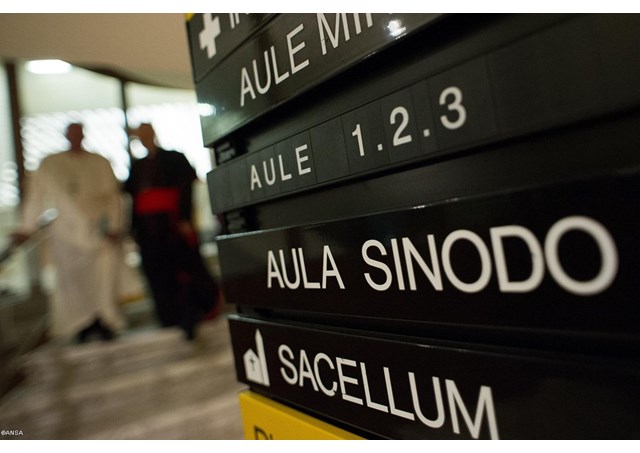-
Participants of the extraordinary Synod for the Family took a pause at the end of their first week of work Saturday. In speeches from seven fraternal Delegates from different Christian confessions Friday afternoon, the synod fathers heard that all Christian families share the same challenges and hopes. In a briefing for journalists Saturday, the Holy See’s press spokesman, Jesuit Father Federico Lombardi said that the eighth fraternal delegate, Metropolitan Hilarion, representing the Patriarchate of Moscow is expected to deliver his address to synod participants in the coming days.
Saturday is a day off for the synod fathers as the synod relators and special secretary work on the Relatio Synodali to be published Monday, and which will present the topics that will be under discussion in the working groups next week.
Speaking at Saturday’s briefing, Dublin Archbishop Diarmuid Martin drew comparisons between the last synod on the family which he attended in 1980, noting that it was the first of Pope John Paul II’s pontificate, as it is of Pope Francis’.
“They saw the centrality of the family for the development of the Church and the stability of society and they also saw the challenges that the family as an institution and families (themselves) had to face in the culture of that moment.”
Friday afternoon, the Fraternal Delegates told Synod fathers that as a fundamental element of society, the family also lays the foundation for a common, just society. But the challenges are many. As the Syrian Orthodox Archbishop Mar Yostinos Boulos Safar noted, the current economic crisis, a mass media that takes away time from family dialogue – sometimes even leading to adultery – wars, migration, globalization, the drama of Aids and Ebola, and Islamic fundamentalism in some countries, are all challenges eroding the family.
Common to all Christians is the need for adequate marriage preparation and reflection on marriage between believers and non-believers. It was observed that preparation for marriage shouldn’t start in adult life but with our children, through offering them models of loving marriages.
Metropolitan Athénagoras of Belgium, representing the Ecumenical Patriarchate of the Orthodox Church, spoke of the need to be neither “too moralizing nor too rigid” towards young people or risk losing the very audience our Church is speaking to.
The Church’s acceptance of divorced and remarried persons can promote a serene family life and thus a richer society came up as one theme – all agree that it is essential to listen with mercy and compassion to those who find themselves in difficult family situations. For the Orthodox delegates, second marriages constitute a deviation and while they are celebrated, it is after a period of pastoral accompaniment to favor the reconciliation of married couples.
This same listening is needed in relation to homosexual persons – who should not be condemned. Though marriage, it was emphasized, remains a union between a man and a woman.
Common to all Christians too is the desire to care for children born in difficult contexts, support victims of violence – particularly women and children – and to defend the vulnerable and voiceless, whether they are Christian or not.
Also central to the interventions by fraternal delegates: the proclamation of the Gospel, with the family as the first school of the faith. It is essential then that Christians share the joy of the Gospel or “evangelii gaudium” that Pope Francis so frequently talks about.
The fraternal Delegates from the Middle East thanked the Holy Father for the September 7, 2013 prayer vigil he led for peace in Syria and throughout the world. The delegates concluded Friday’s session by expressing the hope that the extraordinary Synod on the family would prove successful, especially in view of the ordinary Assembly scheduled for 2015.
Source: radiovaticana.va





